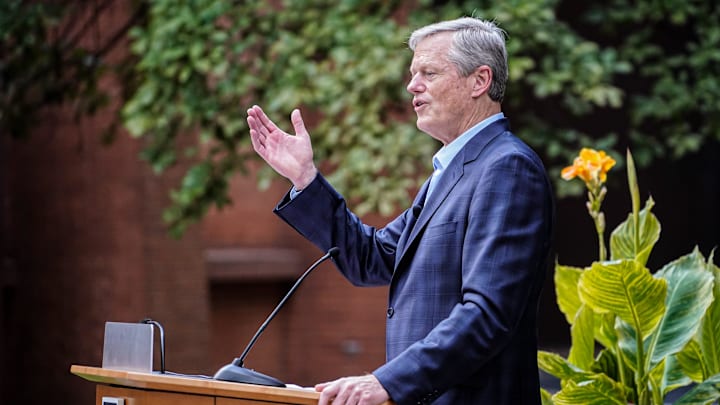NCAA President Charlie Baker Would Welcome Government Oversight After House Settlement

NCAA president Charlie Baker remains confident the association can successfully settle the sprawling House v. NCAA antitrust lawsuit this spring and, in a notable move, would invite increased government oversight of college athletics to ensure a more stable landscape beyond what is covered in the decade-long time frame.
Preliminary approval over a $2.8 billion settlement was granted in U.S. district court by Judge Claudia Wilken in October after objections were raised regarding concerns over booster involvement in NIL deals, the distribution of back pay and potential violations of Title IX laws.
“If the settlement gets approved—and I’m certainly hoping it will be given the preliminary approval—starting in July, this stuff has to actually work,” Baker tells Sports Illustrated in an interview in Las Vegas. “Skip the issue of what it means in the long term, it’s got to work. People need to understand the decisions they’re making, kids need to understand the decisions they’re making.”
The comments came a few hours after a letter filed to Wilken last week from three of the named plaintiffs in the consolidated class-action case—Arizona State Sun Devils swimmer Grant House, TCU Horned Frogs basketball player Sedona Prince and Stanford Cardinal soccer player Nya Harrison—surfaced publicly. It requested the judge also establish the ability for players to collectively bargain for additional benefits.
Baker declined to say if the NCAA would engage directly in talks with Athletes.org (which the three plaintiffs are a member of) or similar representation groups, such as the College Football Players Association and the National College Players Association. He says he has encouraged schools to stay flexible and hopes athletes are educating themselves on the settlement and other pressing issues facing college athletics.
“This is a fairly complicated exercise to implement. It doesn’t have a lot of, thou shalts. There are a limited number of thou shalts in this thing. We are all aware that you have 365 schools in D-I, all of whom are going to have to make some decisions about how and where they want to play in the space. That’s one of the reasons why it’s an opt-in, opt-out model,” Baker says. “I think you’re going to see far more kids on scholarship than you see today. And far more kids engaged in a school-based approach to NIL that, I think in the long run, will be much better for them and for the schools.”
Sitting on the opposite side of the negotiating table, the plaintiffs’ attorney, Jeffrey Kessler, largely agrees with Baker’s sentiment. The veteran antitrust litigator says his clients’ recent letter, which was not sent to the court using his firm, doesn’t have anything to do with the process of approving the settlement and actually endorses the framework being put into place.
“I think that [Baker] and the rest of the NCAA, will feel very good about college sports going forward as a result of the changes in the House settlement,” Kessler says. “I hope that they will continue to focus on other changes outside of the House settlement. Now, would it be an improvement for the athletes with House settled? I view it as a really big step, but it shouldn’t be the end for the process.”
Speaking at Sports Business Journal’s Intercollegiate Athletic Forum in Las Vegas, Kessler made clear the final settlement agreement was by no means perfect, but was the byproduct of compromise on both sides that is set to meaningfully change the way athletes go about their collegiate careers.
Starting with the 2025–26 academic year, athletic departments can opt in to directly sharing just over $20 million in revenue with their athletes. Scholarship limitations in certain sports, like baseball and softball, will be replaced by formal roster limits that are expected to significantly increase the number of players receiving a full ride to college. In addition, the $2.8 billion in back pay for lost NIL revenue is set to be paid out over the course of the next decade to former NCAA athletes.
However, the lack of athlete representation formally negotiating additional protections and/or benefits with the NCAA is a drawback that critics have long argued and a driving force behind the letter.
“The NFL and NFLPA are partners in one of the best businesses in the world. The NBA and [NBPA] are partners in one of the best businesses in the world, right?” says Brandon Copeland, a former NFL linebacker who co-founded Athletes.org and has been involved in organizing athletes across the country. “I’m hoping that they start to look at it through that lens so that they understand that this doesn’t have to be a debate, a battle or something. It doesn’t have to be negative.”
Collective bargaining with players in such a manner, viewed by some as a potential avenue to avert continued legal threats, will remain an issue even if Wilken sidesteps it by moving forward with a final approval of the settlement at a hearing scheduled for early April.
The NCAA has steadfastly opposed the potential for players forming a union and bargaining together on the grounds that it would likely require them to be declared employees. Most are hoping to avoid that, even with several cases pending and the National Labor Relations Board seeking to address it.
With the finish line in sight for the House case, Baker would be amenable to the federal government helping govern college athletics to be unencumbered by a patchwork of conflicting state laws or the threat of additional lawsuits.
“We’re still going to have to figure out some way to deal with the employment question. We have 36, 37 states with different NIL laws,” Baker says. “One of the things this injunction is trying to do, and what we’re trying to do, is at least create a uniform, level playing field on this stuff so that everybody’s playing by the same set of rules. It’s hard for the conferences to deal with this stuff—never mind the NCAA. I’d be willing to do this in some way, where we have to go through a checkpoint of some kind in the federal government to get approval for a rule that involves something that is a nationwide standard. To determine, if in fact, there are any antitrust issues there.
“This idea that if somebody doesn’t like a rule they can just sue, that’s A, really expensive. B, it’s incredibly disruptive. C, it makes it really hard to do what everybody, I think at the end of the day wants, which is to have a level playing field around competitive opportunities that works for student-athletes, that works for schools, that works for fans.”
Baker has made numerous trips to Capitol Hill as NCAA president and previously asked for a limited antitrust exemption to deal with many of the issues. Such efforts did not gain much traction, but the former Massachusetts governor believes the NCAA has begun to address a number of the issues that elected representatives raised. He thinks the time could be ripe for potential movement on formal legislation as a Republican-controlled Congress takes office.
“As a guy who spent 16 years in state government, I’m well aware of the positives and negatives associated with the government,” Baker says. “We don’t need somebody to pass a federal law for us to do this, O.K.? We’re trying to do what we got told to do, which is, ‘Go solve your own problems first and then come talk to us.’
“I sort of feel like, O.K., you gave us a mission, Congress. We’ve done a pretty decent job of following through on your mission. Now let’s talk about these things. I think that puts us in a better position in some respects than some of the other folks who really need Congress to do some very unusual things to get where they want to go.”
Baker notes any such legislation would likely be bipartisan given how narrow the majorities are in both houses but singled out the efforts of Sen. Ted Cruz, the recently reelected Texas Republican who is set to chair the U.S. Senate Committee on Commerce, Science, & Transportation, as being particularly invested in getting something done over the coming months.
Until then, the work remains in getting the House settlement over the line and, critically, putting it to practice.
“In the end, it’s a big win for student-athletes and a big win for college sports,” Baker says. “There is a ton of work that schools, and we [the NCAA], need to do, just to implement this thing. It is a major thing in the way people operate and make decisions. That’s true for everybody in D-I and it’s true for the NCAA as an operating entity. My focus and my attention is on that, because there’s a lot of what ifs for all kinds of other things. But the biggest what if for me is that this thing needs to launch in a way that is consistent with how people expect it to launch.
“That’s really where my fundamental focus is going to be.”
